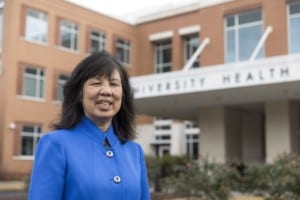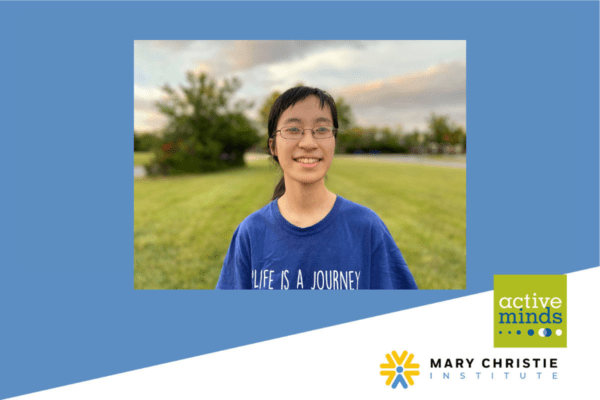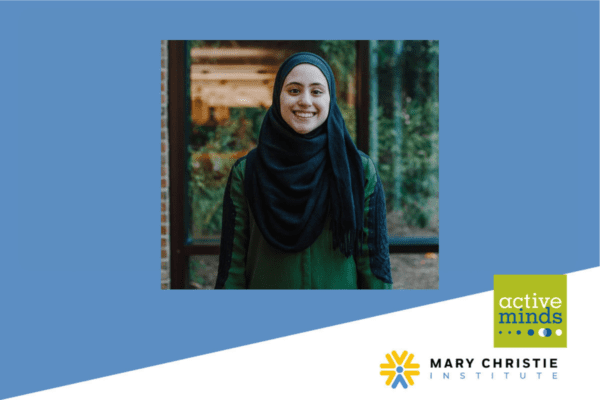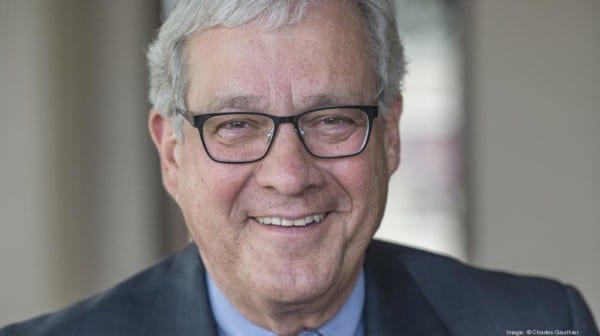As we continue to recognize the expertise of college health leaders in our FRONTLINES column, Dr. Jean Chin, from the University of Georgia, stands out. She is a superb role model for all who have been fortunate enough to work for or with her. She developed her focus on service to others from her parents whose ancestors came to the United States in 1870 from China. It was Jean’s vision that brought to life the state-of-the-art 110,000 square foot University Health Center at the University of Georgia, along with a collaborative health model where integrated health, counseling and wellness services provide coordinated care for their students. Jean just received the prestigious Lifetime Achievement Award in June 2021 from the American College Health Association as recognition of her leadership and accomplishments in college health. Enjoy reading about this outstanding professional!
_______________________________

Jean E. Chin, MD, MBA, FACP, FACHA (Photo by Andrew Davis Tucker/UGA)
Gerri: Your college health experience was all in Georgia – are you originally from Georgia?
Jean: Actually, I was born in Galveston, Texas. My father was a marine biologist. We moved many times to coastal towns and ended up in Georgia in 1970. My sister and one brother are lawyers and another brother is an endocrinologist.
Gerri: When did you first think about medicine or science?
Jean: I remember in fourth grade saying I was going to be a doctor. I was like a train, and nobody was going to derail this train. My dad said I was painfully shy. He wanted me to become a pharmacist, so I wouldn’t have to interact with a lot of people. He told me a few months before he passed away that when he came to one of my presentations when I was in fourth grade he was cringing. He was holding his head thinking I was going to be a nightmare. But I got up there and was like a different person. I haven’t stopped presenting since.
Gerri: Why medicine?
Jean: It was the purest reason – I wanted to help people. And in my fourth-grade mind, that was the way to do it. My dad wanted to be a physician. He was a child of the depression, and he was one of nine, so his family couldn’t afford to send him to medical school. From that time, he always had the idea of service. So did my mother; She believed in making sure that all people were honored and treated well. They ingrained that in us.
Gerri: Tell me about your parents.
Jean: My mom graduated from high school and she didn’t drive. She was a stay-at-home mom and spent her entire life taking care of us. My dad was a professor. He travelled the world as a marine biologist and was chief science officer on expeditions to the Indian Ocean. Both of my parents and their parents were born in the United States. My great-grandparents came to this country in 1866 from the village of Tai Wan in the Sun Ning District of Toishan in China – through Angel Island near San Francisco. Angel Island is called the Ellis Island of the west. My great grandparents had two sons – one was my great grandfather, Bork Hee, who was born in Folsom, CA on Aug 8, 1871. The faces of some of my relatives are etched into historical displays on the island. Our family settled in San Francisco, lost everything in the San Francisco earthquake and subsequent fires in 1906. They moved east in 1923. My mother was born in Maine and my father was born in Boston.
I started at UGA as a staff physician and left the health center as executive director 30 years later. I planned to be there for three years, but there’s something about college health that just makes you stay.
Gerri: I imagine that the xenophobia of the past year had to be very hurtful.
Jean: Oh yes. It’s very hurtful to know that you’re seen as a stranger in the country that your family has been in for four or five generations. One great regret I have is not to have learned Chinese, as my family all spoke English.
Gerri: What can be done to combat the effects of xenophobia?
Jean: Colleges and universities need to stay attuned to the needs of international students and AAPI (Asian American and Pacific Island) students, particularly with the amount of anti-China rhetoric that has been pervasive in the media. Most of the guidelines from the American College Health Association Covid-19 Task Force specifically addressed xenophobia and provide considerations for leadership at Institutions of Higher Education. Leaders need to be aware that AAPI students are not a monolithic group but have different cultures, needs, expectations, and values and address these needs through services and educational programs. My advice for Asian students is to seek help if needed, whether financial, academic, medical, or mental health-related. Students who are struggling often feel that they are the only ones struggling and this is just not true.
Gerri: Tell me about your early years as a physician.
Jean: I had a National Health Service Corps scholarship to cover the cost of Tufts Medical School. In return I committed to serve three years in a rural area after residency. As part of that program, I was recruited by Wrightsville, Georgia, a town that needed a physician because their one physician was about to retire. I didn’t know enough to know how hard that was going to be. The National Health Service Corps sent a consultant to help me get started. I sold shares of stock in myself to the town businesspeople who recruited me. With the money, I built a clinic. I was by myself on call 24/7 for three years. I did not take a vacation. And when you live in a small town, everyone knows where you live. They’ll come by, knock, knock, “Doc, can you come? I cut my head,” – and of course I came. One of the factories was a sewing factory. I would frequently be called there to remove sewing machine needles out of people. I did internal medicine, was the medical examiner, took care of all the nursing home patients and staff, did all the sports physicals, and cared for the industrial workers. It was one of those Doc Hollywood kind of stories. I learned how to do so much. I even sutured injuries from chainsaw accidents. I paid back my stockholders within the first year or so.
Gerri: How did you get to college health from there?
Jean: Wrightsville, Georgia was about two hours south of Athens, between Athens and Savannah. My husband was working in Savannah and decided to go back to school and get his Ph.D. After I completed my three-year commitment in Wrightsville, I took a position as a staff physician at the University of Georgia. I was well prepared after working a solo private practice. Three hundred of my best friends worked at the Health Center with me, and they quickly became my social life too – we provided health care for the 38,000 UGA students with about 6,000 living on campus. I started at UGA as a staff physician and left the health center as executive director 30 years later. Even though I planned to be there for three years, there’s something about college health that just makes you stay. I loved college health – especially the camaraderie. In internal medicine, at big conferences, everyone sits alone and reads their newspapers. They don’t talk to anybody. That’s not true in college health, where at a meeting, the minute you walk into a room, somebody says, “Come on over and sit with us and tell us about yourself and what’s going on at your school.” I am still at the University of Georgia as an associate professor of medicine at the Augusta University/University of Georgia Medical Partnership.
Gerri: What was one of your biggest challenges in college health?
Jean: We needed to expand our building because we had counseling and psychiatric services moving in, and we were already tight on space. Senior administrators would not approve the building expansion until we received outside confirmation of the need, not only for the expansion, but to justify the reason for having a student health center at all. We asked for a consultation from the American College Health Association. I was fortunate that ACHA sent two great leaders, Dr. Phil Barkley from University of Florida and Dr. Jim Mitchell from Montana State University. If it were not for them justifying the University of Georgia’s need for a student health center and the expansion, we wouldn’t have a building. We ended up with a beautiful 111,000 square foot showpiece. We showed it off in 2011 to college health when I hosted the Southern College Health Association meeting.
Gerri: Who were your advocates during this time?
Jean: Thank goodness for my boss – the Associate Vice President for Student Affairs, Dr. Tom Burke and the Vice President Dr. Rodney Bennett. I had many mentors – Dr. Flo Winship, the former medical director, who taught me patience, as well as Dr. Jacque Kinder, the former executive director, who taught me the politics. When I became the executive director, I missed the clinical part of being medical director, so I threw myself into the Student Health Advisory Committee (SHAC). Working with SHAC gave me a chance to be with students again. I learned as much from them, as they probably learned from me. I continue my involvement in college health through the American College Health Association.
Gerri: Can you tell me about how your university managed mental health issues?
Jean: One of the greatest things that happened to the health center was also one of the most traumatic things. Around 2004, the university decided to merge counseling services into the health center’s mental health clinic, and that brought about a dozen new people into the health center. Counseling folks and medical folks came from different philosophies in diagnosing, documentation, and charging for services. Even the jargon clashed – patient, client, student. It was turbulent early on but ended up being one of the best things that happened in the health center after those first years of growing pains.
Gerri: Any serious mental health issues at your health center?
Jean: There have been suicides. Alcohol and other drug use became a focus in 2006, when a student died in one of the residence halls after a night of drinking. Shortly after, the Fontaine Center came into being. Jack Fontaine was one of our biggest and most generous donors. His beautiful son, John Fontaine Jr., named after his dad, was a passenger in a vehicle. He was unrestrained, and his buddy who was driving hit a tree. Young John Fontaine went through the windshield and was killed instantly. The Fontaine Center was created out of funding from the Fontaine family – they were passionate about a center for education, early intervention, and recovery treatment. Their center has been a lifesaver.
Gerri: Then how did you become the inaugural chair of the COVID-19 Task Force?
Jean: Devin Jopp from ACHA called and asked me to be the chair of the COVID-19 Task Force. He wouldn’t take no for an answer, even though I said no plenty of times. Finally, I said, “If you get my buddy Mike Huey from Emory to be on the task force, I’ll do it.” We started with what I called the COVID nine, a group of nine intrepid college health leaders. We wrote the first set of guidelines in early March of 2020. The media calls and webinar requests came flooding in, and we were quickly overwhelmed. Devin said, “I’m going to put a call out to the emeriti ACHA leaders who are retired or working part time.” And all of them came to help. They were productive from the start. We accomplished a lot with webinars, press interviews, development of guidance for colleges on preparing for COVID and also guidelines for reopening in the fall of 2020. Once medical school restarted in the fall, I needed to be there, so I stepped down from the chair role, but remained active on the task force.
Gerri: Why did you leave the college health center?
Jean: I needed to care for my dad. He was about 90 years old when his health started to fail. His mind was sharp, but he would forget to eat dinner and he had a few falls. I moved in to help him and stayed for 24 months with help from my siblings. After he passed away, I went back home and went to work for the medical school – three half days a week.
Gerri: You are a busy lady – what do you do to relax?
Jean: I still walk with my health center buddies – on weekends and on Tuesdays and Thursdays during their lunch break. And I love to read and write. At one time, I thought I would be a librarian or a journalist. I don’t know that I’m a great creative writer, but I could write reports like nobody’s business. I can write business plans, presentations, documents. For some reason I see something and can synthesize it.
Gerri: Do you travel?
Jean: I’ve been to Italy and Ireland, Canada, Mexico and much of the Caribbean. I travel to Hawaii frequently, as my parents are interred at the Punchbowl, otherwise known as the National Memorial Cemetery of the Pacific. It is the Arlington cemetery of the Pacific. My dad fought in the Pacific in World War II and all of his war buddies are buried there. I would like to return one day once travel is more safe again.
Gerri: So, what does the future hold for Dr. Jean Chin?
Jean: I will continue with the COVID-19 Task Force. I’m not looking at retirement again – my second retirement – for four to five years. My daughter delights in telling people how I failed miserably at retirement. But for right now, I’m still working at the medical school and am trying to get the Foothills Charter School clinic open for the fall. Foothills Charter School is an alternative high school for students who can’t go to traditional high school during the daytime. Foothills is a self-paced program for students aged 16 to 30 to get their GEDs. We are discussing hiring a clinic manager, not just for the Foothills clinic, but for all the mobile clinics affiliated with the medical school. They have their own school nurse and social workers already in the school. With me as the supervising physician and eight medical students, all we need is for students to come back for in-person learning. I want to get that off the ground this year. Luckily, I don’t have to sell shares of stock of myself anymore.
Gerri: I can tell your train once again will NOT be derailed – you will continue to help people and provide service – a testament to your parents, to your commitment, and to your work ethic! The state of Georgia and ACHA are lucky to have you. I have to say I agree with your daughter – you have definitely failed retirement! Keep up your great service! Thanks so much, Jean.




